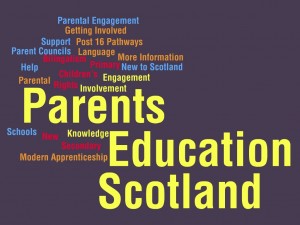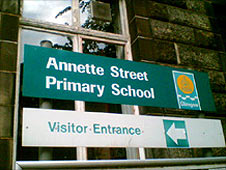
Christian Allard is originally from France, he became involved in his daughters’ secondary school Parent Council simply because he wanted to offer the school his support. Involvement in the Parent Council led to involvement in the Community Council, getting involved in the development of the Curriculum for Excellence and eventually to Christian becoming a member of the Scottish Parliament. Hear Christian talking about the impact getting involved in the Parent Council made on him
With the recent arrival of families from Syria we have been thinking about the experiences of parents from asylum seeker backgrounds and their relationship with school. Asylum seekers, like other migrant families, are new to the Scottish education system and often new to English. They will need support to be able to help their children with their learning and to understand how their children are being taught. Asylum seeker children also may be traumatised by their experiences in their home country and in the journey to the UK. Schools are the first communities that they will come into contact with and even small acts can make a big difference to helping families feel welcomed
The teachers try to speak Arabic to us, some words, at the school there is a lot of culture awareness, teachers and pupils are kind. My kids have never been bullied. It also provides Halal food. Flags of a lot of countries are put up on the walls of the school (Both parents, Syria)
Gathered Together conducted a questionnaire of over 164 parents from ethnic minorities about their experiences of school, their involvement and knowledge of the Scottish education system, from this questionnaire we identified 16 respondents who were from asylum seeker or refugee backgrounds including countries like Iraq, Syria and Afghanistan. From analysing their responses it was clear that, while the majority of parents were really happy with their child’s school they did not feel that they understood the education system and the exam system. We believe that parents are partners in their children’s learning and they need the right support to be able to work with the school to enable their children to thrive.
I would like to know more- how to help my son in his homework, but I don’t know how (Mother, Iraq)
You can read the briefing paper on the experiences of asylum seeker families and our recommendations here
A few weeks ago we were invited to join Stirling Council’s English as an Additional Language teachers Tricia Davenport and David Fletcher for an information session for new parents about Scottish Education. The session was a whistle stop tour of the schools system in Scotland that answered a lot of questions and helped me to finally understand how the new exam system works. Among the questions answered were:
We know from our work with parents who are new to Scotland that they have a lot of questions about the education system. From the fact that children in the UK start school age 5 (unlike many European countries where children don’t start formal education until they are 6 or 7) to the lack of formal testing in primary school there are big differences between parents’ own experience of school and the way their children are being taught. Information events like the one I attended in Stirling are vital as they give parents the opportunity to ask questions and understand how things work in Scotland. To make sure that the parents fully understood the session translators were provided including two sixth year pupils (from China and Poland). Tricia and David helped them to prepare before the session and both the young interpreters sat with a parent and explained what was being said by the presenter. As well as making sure that the parents were given the information in their own language the student interpreters will get certificates recognising their work. By giving them the chance to use their linguistic skills the EAL service was showing them the value of speaking two languages and to recognise what a gift bilingualism is.
Reaching out and engaging with these families can make a huge difference and give them reassurance and a sense of belonging. As David said, “We realise how traumatic it can be for families who move to a new education system, and there can be significant differences between education in Scotland and in other countries. These sessions are a good opportunity to meet parents in an informal setting, to discuss concerns and questions.”

We asked 164 parents from ethnic minorities about the Scottish Education system and their children’s school – 73% did not know what the Curriculum for Excellence was.
Gathered Together are putting together a series of workshops to help parents understand and be more involved in their children’s education and what happens in schools.
We will work with the experts in each field to help those parents who are new to Scotland or those who have grown up in a different education system to help explain different stages and aspects of education.
Our partners will include:
Each of the six workshops will be run in both Edinburgh and Glasgow from 10.30-12.30pm. (For details about individual sessions go to our events page)
Places are limited so please book your place as soon as possible by filling out the registration form at the link below:
https://www.surveymonkey.com/s/JC5PRV9
| Workshop | Glasgow Adelphi Centre |
Edinburgh Quaker Meeting House |
|---|---|---|
| Primary School Information | 30 September | 1 October |
| Secondary School Information | 7 October | 8 October |
| Post 16 Education and Choices | 21 October | 22 October |
| Parental involvement and engagement | 28 October | 29 October |
| Mother tongue- at home and school | 4 November | 5 November |
| Children’s Rights in Scotland | 11 November | 12 November |
 Today we were invited to the world premier of “Our children’s future- learning in Glasgow” at Annette Street School in Govanhill. The schools and nursery in Govanhill (Annette Street, St Brides, Cuthbertson, Holy Cross and Govanhill nursery) had been working together to make a short film for new parents, explaining, in their own words the important information about schools in Scotland. It was generously funded by Eurocities and the Scottish Traveller Education Programme, particularly to help the Roma population in the area. Govanhill has always been a diverse area with families from Ireland, Pakistan, Poland, Slovakia and Romania making their homes here. Parents who are new to Scotland are often unaware of the differences between here and their home country- the right to get a place in nursery for 3-4 year olds, the fact that primary school education starts when children are 5 and what children should bring for gym class.
Today we were invited to the world premier of “Our children’s future- learning in Glasgow” at Annette Street School in Govanhill. The schools and nursery in Govanhill (Annette Street, St Brides, Cuthbertson, Holy Cross and Govanhill nursery) had been working together to make a short film for new parents, explaining, in their own words the important information about schools in Scotland. It was generously funded by Eurocities and the Scottish Traveller Education Programme, particularly to help the Roma population in the area. Govanhill has always been a diverse area with families from Ireland, Pakistan, Poland, Slovakia and Romania making their homes here. Parents who are new to Scotland are often unaware of the differences between here and their home country- the right to get a place in nursery for 3-4 year olds, the fact that primary school education starts when children are 5 and what children should bring for gym class.
All this information, and more, was covered in the film- but more importantly it was given by parents who have already gone through the system and were talking in their mother tongue. Hearing from another mother in your language what happens in school is far more reassuring and easy to understand- hearing it from the “horse’s mouth”. The film also had children from the schools talking about what happens in school- from showing off the “bug hotel” in the school play ground to demonstrating what to wear for gym class.
It was a real pleasure to attend, all the film stars looked so pleased and a real effort was made to make the event special- red carpet, bouquets of flowers for the mothers who appeared in the film and huge slices of cake served after the premier. Events like this help families feel a part of the school, giving a sense of belonging and the film has a far more lasting legacy- helping new families understand their children’ school.
You can see the film on the STEP website here